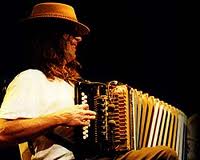 Renato Borghetti is a phenomenon without equal in his genre. As we can glean from his name, his family has Italian origins, even if he is a hundred percent Brazilian having lived all his life in Porto Alegre, in the Rio Grande do Sul state. He likes spending his days off in his fazenda on the other bank of the Rio de la Plata River, near his father’s bigger fazenda, where he also recorded some of his videos, amongst nature, animals and music, one of which I had the good fortune and the pleasure to participate in. Renato plays an instrument called the “Gaita Ponto”, a diatonic accordion in right-hand manual and with 40 basses in the left. His actual group is a quartet with accordion, flute/ soprano sax, piano and guitar. His music also crosses over into other Brazilian genres, but it’s deeply rooted in the Gaucho style, with elaborations of popular themes and traditional songs as well as new compositions. Renato never forgot his gaucho look, and his success shows no signs of decreasing, to the point where his group has been regularly invited to play in Europe for a good few years now to participate in events like jazz festivals, with which his style seems to have little in common. He has held the record for sales of an instrumental CD in Brazil.
Renato Borghetti is a phenomenon without equal in his genre. As we can glean from his name, his family has Italian origins, even if he is a hundred percent Brazilian having lived all his life in Porto Alegre, in the Rio Grande do Sul state. He likes spending his days off in his fazenda on the other bank of the Rio de la Plata River, near his father’s bigger fazenda, where he also recorded some of his videos, amongst nature, animals and music, one of which I had the good fortune and the pleasure to participate in. Renato plays an instrument called the “Gaita Ponto”, a diatonic accordion in right-hand manual and with 40 basses in the left. His actual group is a quartet with accordion, flute/ soprano sax, piano and guitar. His music also crosses over into other Brazilian genres, but it’s deeply rooted in the Gaucho style, with elaborations of popular themes and traditional songs as well as new compositions. Renato never forgot his gaucho look, and his success shows no signs of decreasing, to the point where his group has been regularly invited to play in Europe for a good few years now to participate in events like jazz festivals, with which his style seems to have little in common. He has held the record for sales of an instrumental CD in Brazil.
1. Renato, tell us about the beginning of your career, when everybody was calling you Borghetinho do Acordeon. I began playing accordion in a place called CTG (gaucho tradicional center) around the same time that the “nativista” movement with festivals based on the roots of native music came about in Rio Grande do Sul.
2. Why is the instrument you play called the “Gaita Ponto”? What is its history? Are there other high level musicians who play it? Its called gaita ponto because of one of the characteristics of this instrument; each button has two tunings, one for when you open it and another when you close. And it has only one botton that has the same tuning in opening and closing the bellows. We call it the “point”. The piano accordion (the big one) is very much more popular than the other type (the “point” accordion) in Rio Grande do Sul; that’s the reason there are fewer musicians that play this little instrument. But I can mention some excellent players like Gilberto Monteiro e Chico Brazil and more.
3. How do you describe your musical genre? And how do you explain that festivals with a completely different core, like jazz, are inviting you more and more? I always try to make my music with universal character, and free for improvisation. Maybe that’s the reason for the invitations, but, I also try never to lose the spirit of my homeland.
4. Are you self-taught, as many other Brazilians, or did you have teachers? Did you explore other musical styles or are you an artist dedicated to interpreting gaucho-style music exclusively? My musical formation is absolutely self-made. Like I answered in the question above, I play “música gaúcha” but I try to be open in allowing influences from other rhythms like forró, latins, samba etc.
5. Brazil is for surely one of the Countries where music is greatly loved and popular. However, the level of schools is not very high, and the most talented students move abroad often because they are not attracted by the low level of Musical Universities. It seems that governments have for a long time now, been undervaluing musical studies. What can you tell us about this situation? Maybe it is time to create pressure to provoke the government in to action over this matter? The Brazilian government took a very big step in this past year of 2008, making music teaching obligatory in “1st grade” schools (same level of USA’s “high schools”). This fact, added to the natural Brazilian condition which is given easily to musical inspiration bodes well for some very good music and musicians in not so distant future.
6. If the truth be known, many local administrations, as well as the Federal Government, are allocating important amounts of money to promote festivals, musical competitions, concerts; and much more for all the world of popular dance. Why has there been so little consideration given to preparing the musicians of future? There are in Brazil 3 cultural laws (federal, state and municipal laws) that have provided incentives to stimulate companies and big sponsors to promote cultural initiatives, across many kinds of cultural activities, not only music.
7. What have been the best moments of your career? Have there been great concerts which marked your career, demonstrating to you the best direction to take? Yes. It was when I received an invitation to play in the most important Brazilian festival called Free Jazz Festival in Rio de Janeiro, sharing the same stage on the same night with Stephan Grapelly, Ron Carter and Tony Williams. It showed me that I was on the right track!
8. Your popularity is so big that many companies use your image for merchandising. Do you think this is just down to the quality of your music or also for other reasons? I think that artistic work is multi-faceted but always based on quality. Without it, there can be no work. And it’s very important to have a good marketing strategy, good instruments, good musicians and a good production office.
9. What are your plans for the future? Do you still have all the necessary enthusiasm to be a touring musician or are you thinking of preparing something alternative? My future plan is to take the “Fandango!” to Europe thanks to the Italian label Felmay Records. The album was recorded on my farm in Barra do Ribeiro, in the countryside of Rio Grande do Sul, and recently nominated for a Latin Grammy 2008 in the Best Traditional Album category.
by Mirco Patarini

 English
English Italiano
Italiano 





Leave a comment
You must be logged in to post a comment.